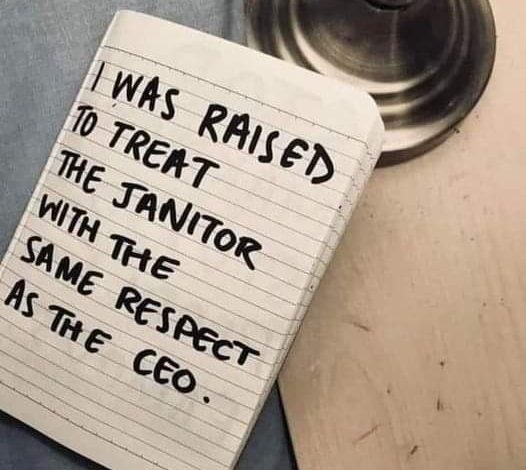
ADVERTISEMENT
Respect: A Universal Value
Introduction
Respect is a cornerstone of human interaction, transcending roles, professions, and societal hierarchies. The image of a handwritten note reading, “I was raised to treat the janitor with the same respect as the CEO,” encapsulates a powerful principle: every individual deserves equal dignity and acknowledgment, regardless of their status or job title. This simple statement is a reflection of moral upbringing, humility, and the value of human equality.
Body
Respect begins with recognizing the humanity in everyone. A janitor, often perceived as holding a humble position, plays a vital role in maintaining cleanliness and order, ensuring that workplaces, schools, and public spaces are functional and welcoming. Their contributions, though sometimes invisible to many, are indispensable. On the other hand, a CEO leads organizations, making critical decisions that influence growth and success. While the nature of their roles differs, the intrinsic worth of the people behind these roles remains the same.
Treating people with respect, irrespective of their position, fosters inclusivity and harmony in society. It eliminates discrimination, whether based on economic status, occupation, or background, and paves the way for mutual understanding. A workplace, for instance, thrives when employees across all levels feel valued. Respect not only boosts morale but also enhances teamwork, as it creates an environment where everyone’s contributions are acknowledged.
The upbringing reflected in the note is a reminder of moral education that begins at home. Parents and mentors instill these values in children, teaching them to see beyond titles and appreciate the effort, character, and dedication of every individual. This foundational lesson influences how people treat others throughout their lives, shaping a more empathetic and just society.
ADVERTISEMENT
Moreover, this principle is not limited to personal interactions; it extends to institutions and communities. Respecting every worker’s role, from the janitor to the CEO, emphasizes the interdependence of society. It reminds us that no task is insignificant and that success is often the result of collective effort.
Conclusion
The note, though written in plain handwriting, carries a profound message about the essence of humanity. Respecting individuals for who they are, rather than what they do, is a testament to our shared humanity. Whether it’s the janitor who ensures cleanliness or the CEO who charts the organization’s path, every role contributes to the bigger picture. Let us embody this value in our actions and interactions, creating a world where dignity is universal and respect is given freely.




